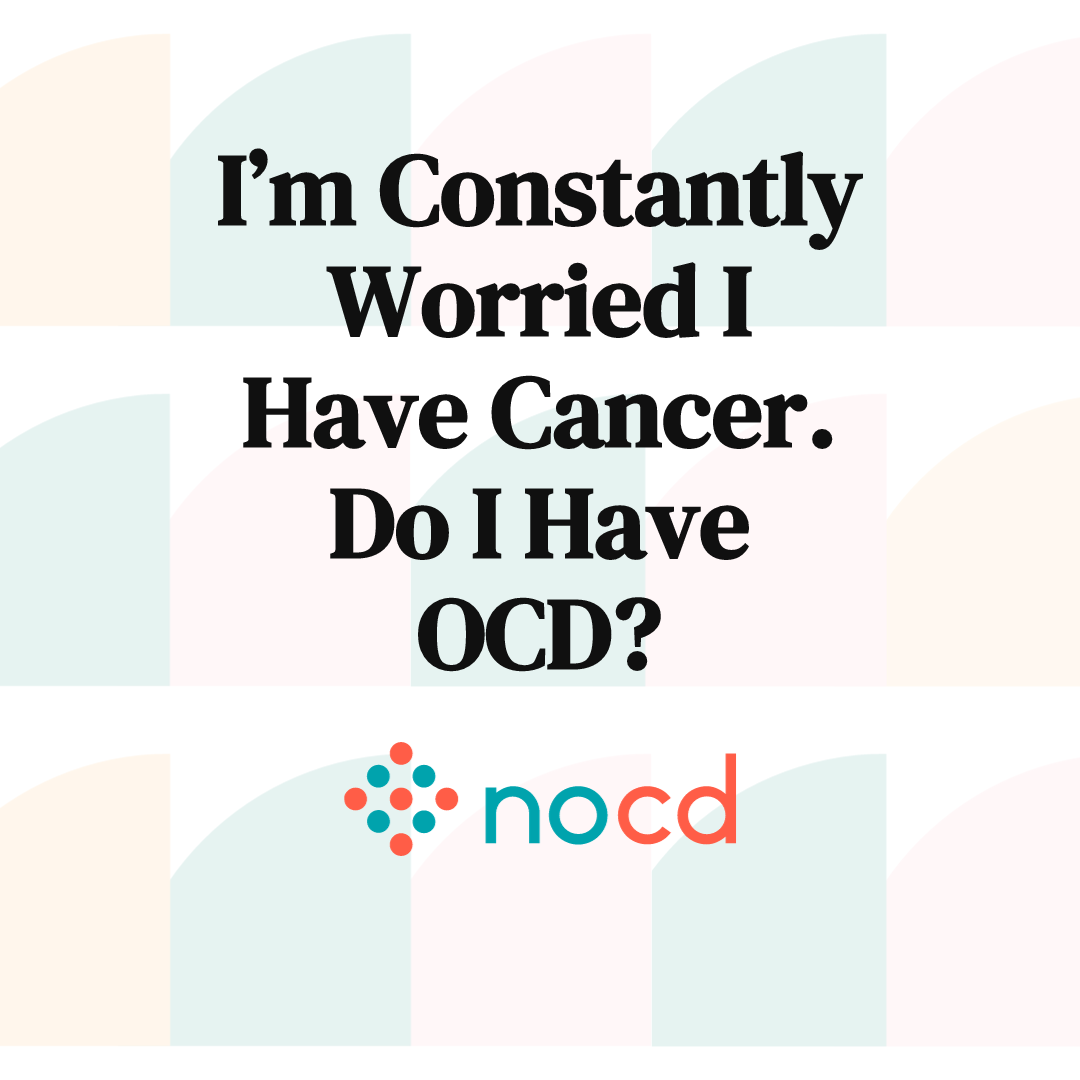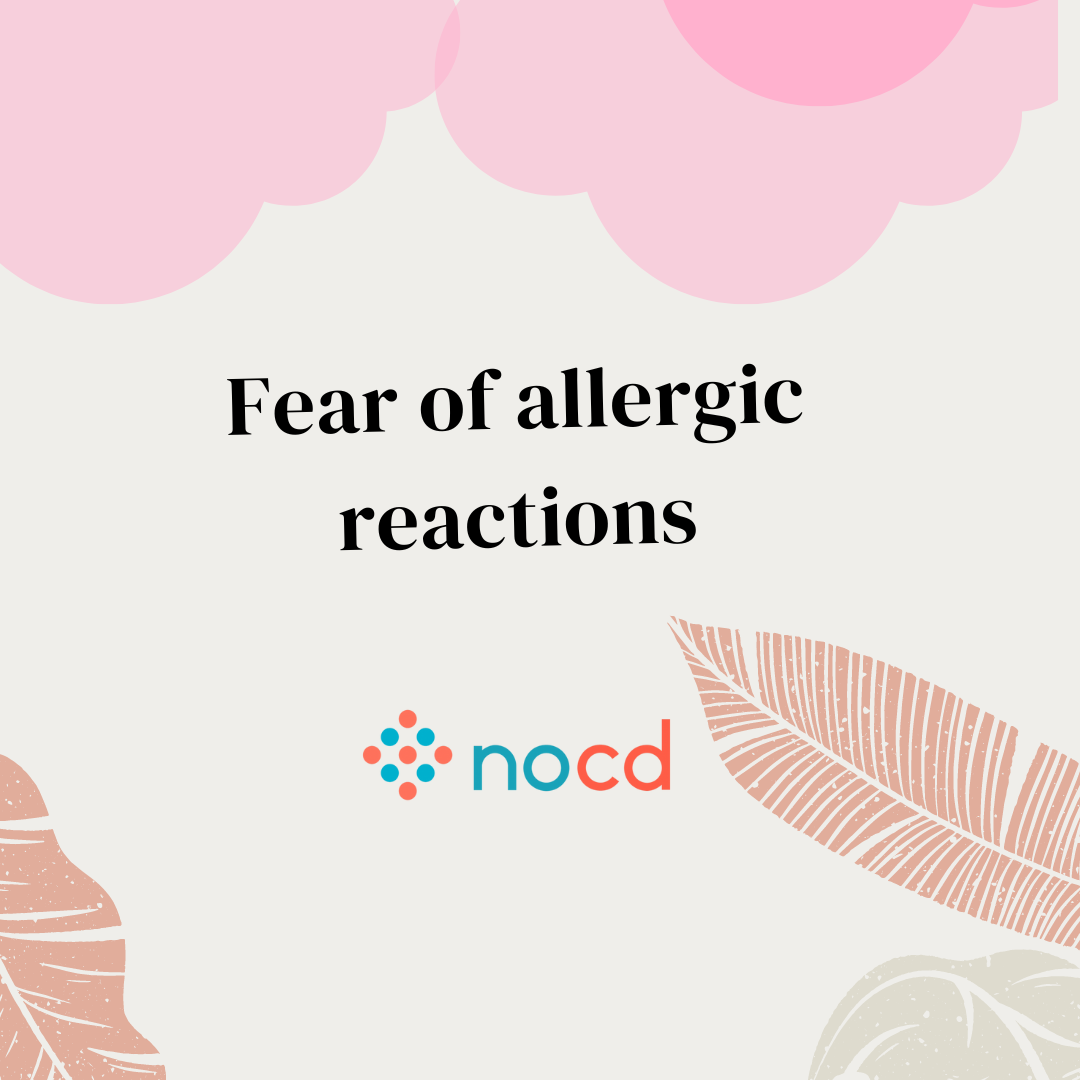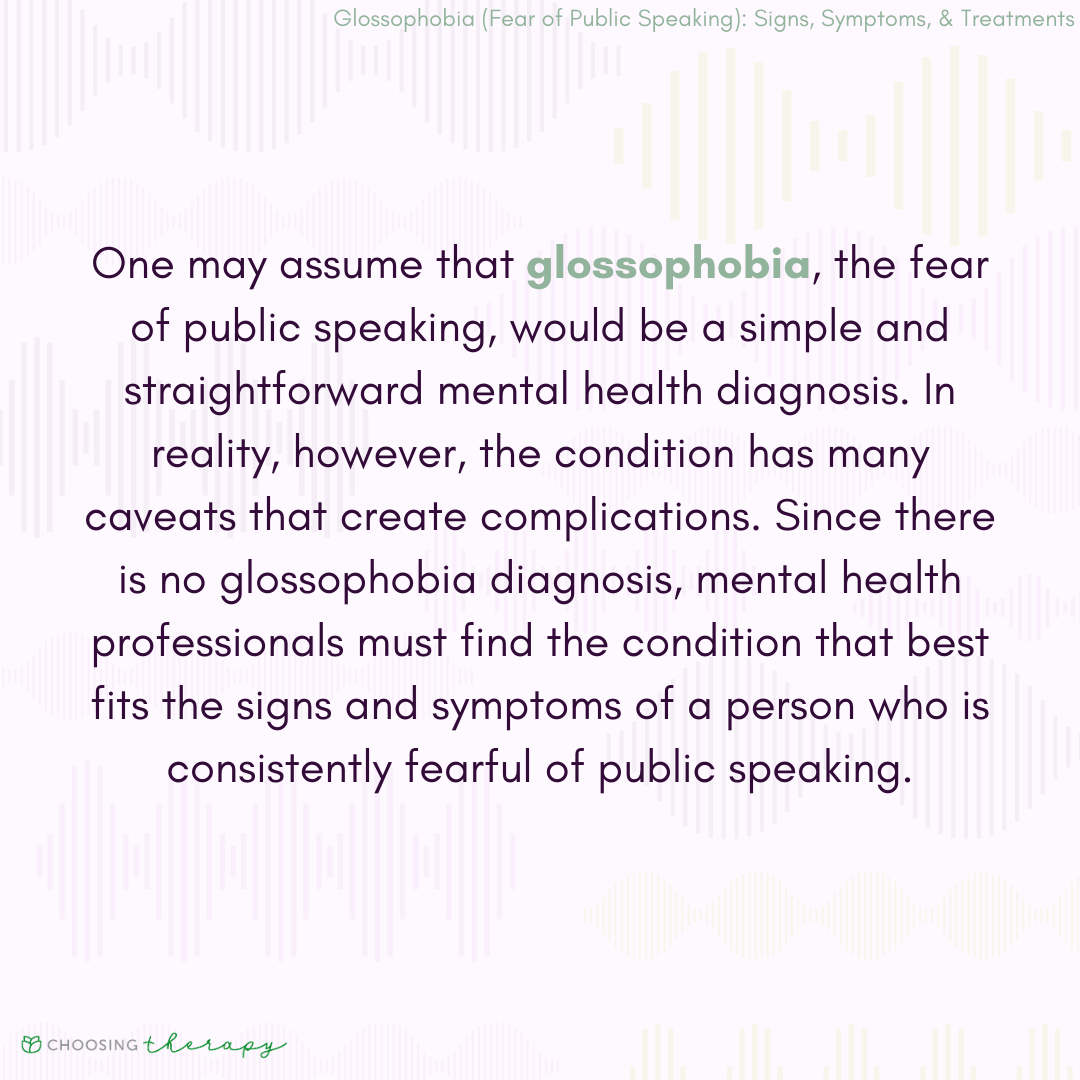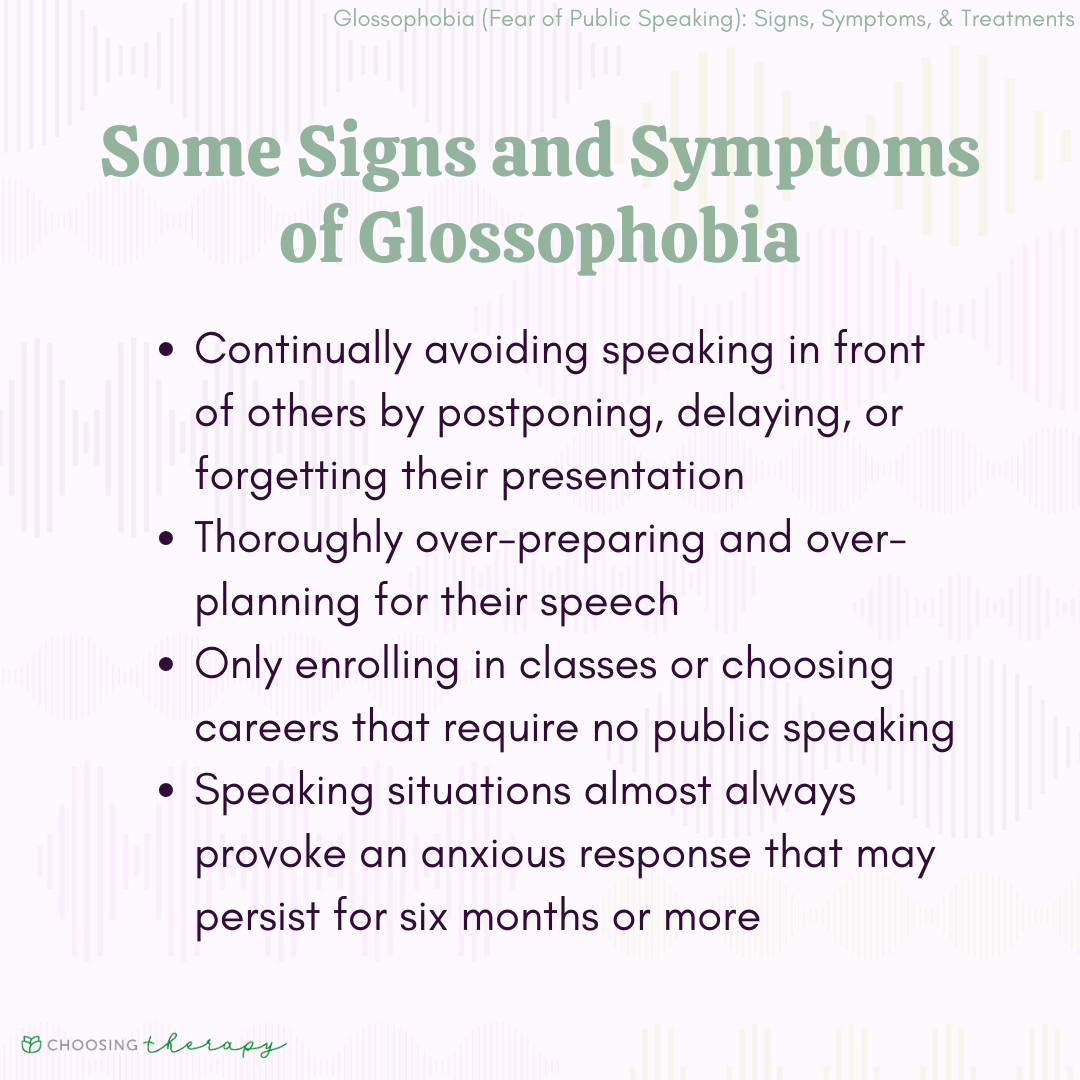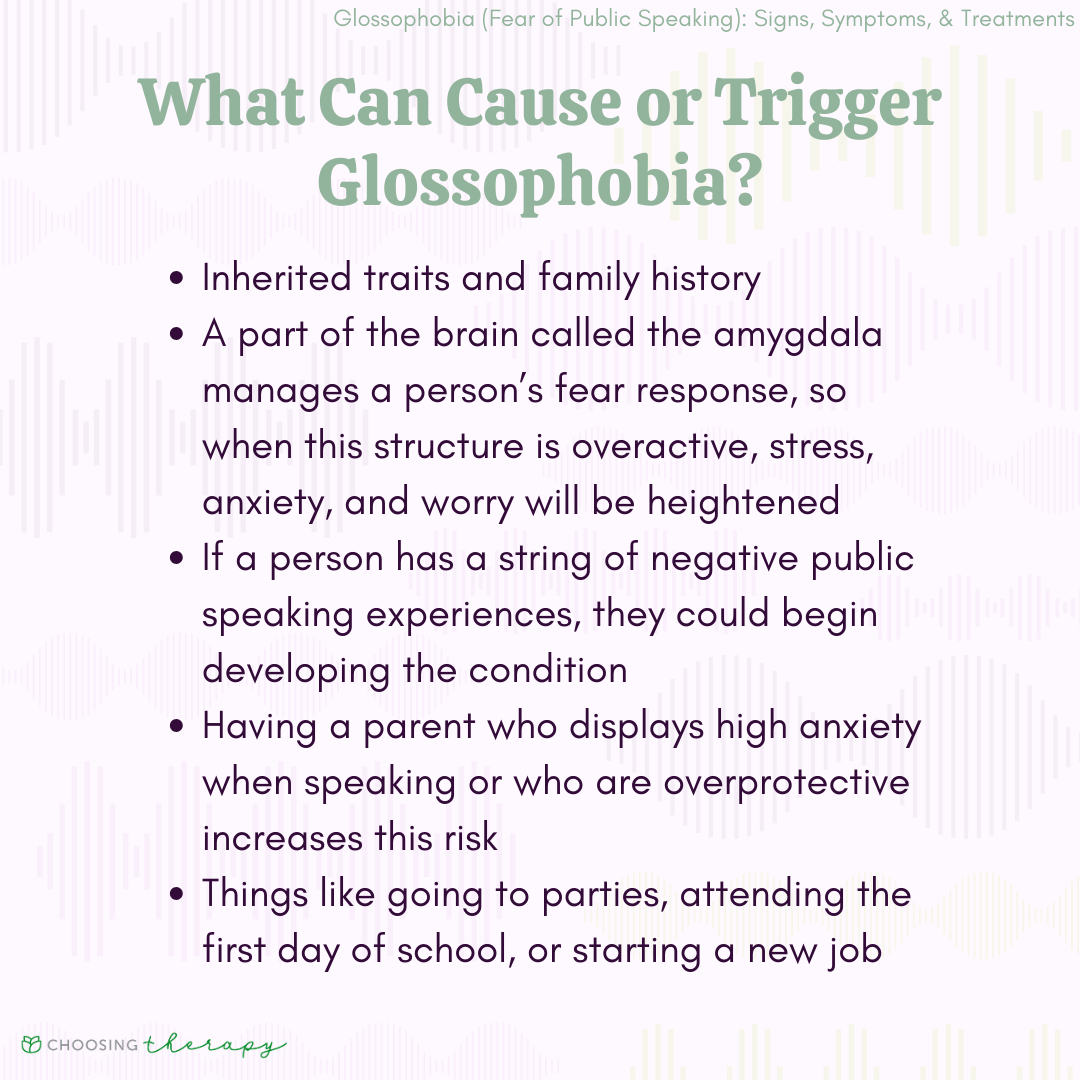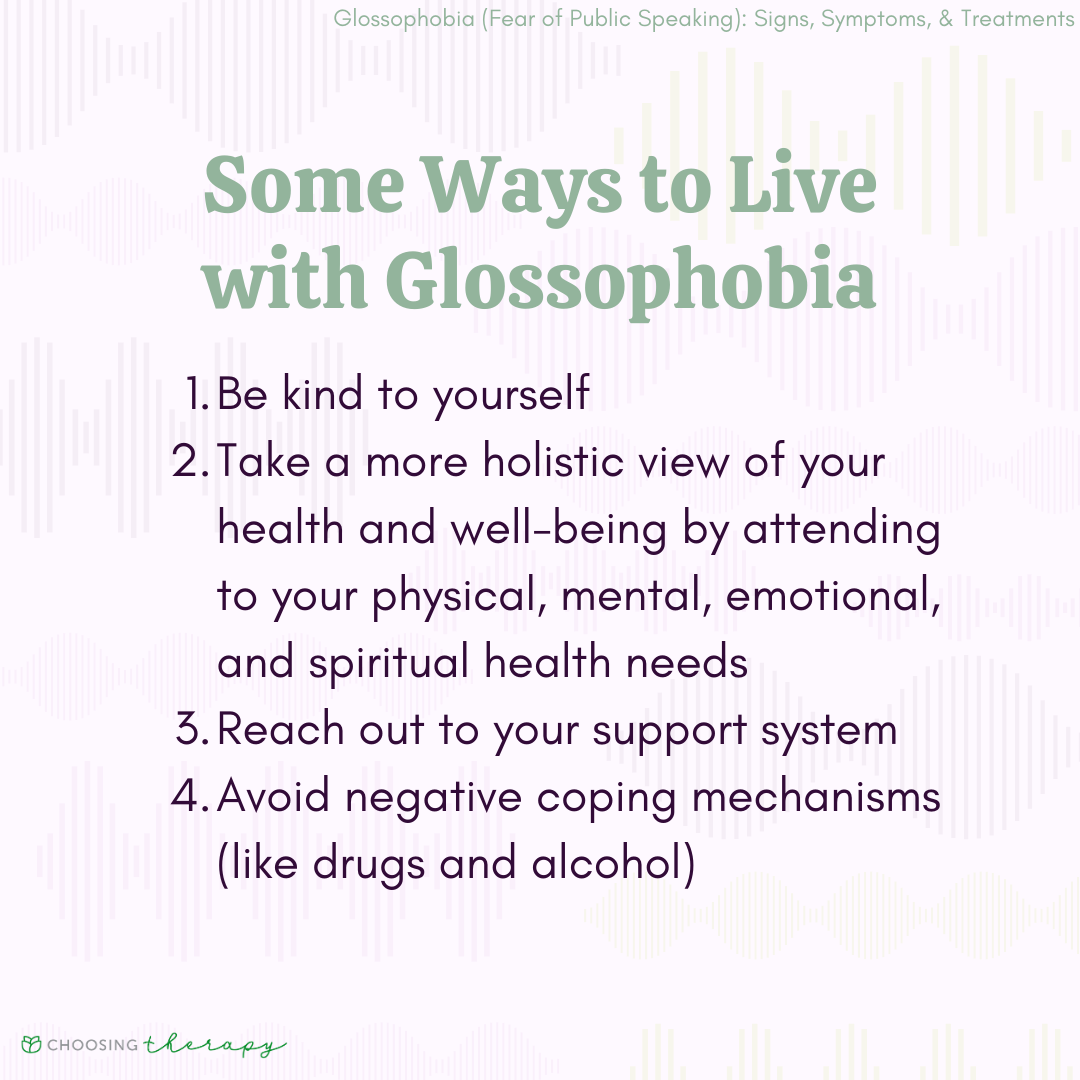Glossophobia, or the fear of public speaking, may impact a person’s mental health and success at work and school. With more than 75% of people reporting this fear, speaking in public is perhaps the most common type of anxiety.1 Fortunately, with the right treatment, symptoms can quickly diminish to allow someone to give public presentations with minimal fear.
Would you like to have less fear and anxiety? Therapy can help. BetterHelp has over 20,000 licensed therapists who provide convenient and affordable online therapy. BetterHelp starts at $65 per week. Take a Free Online Assessment and get matched with the right therapist for you.
What Is Glossophobia?
Glossophobia involves the fear of public speaking and worry of judgment from others during a speech or presentation. Glossophobia fits into the category of social anxiety disorder, sometimes called social phobia. More specifically, someone with an intense fear of giving speeches or presentations in front of an audience would likely receive a diagnosis of “social anxiety disorder, performance only.” Here, the “performance only” specifier distinguishes the condition as one triggered only by speaking or performing in public.2
Despite its name, glossophobia is not a specific phobia. Specific phobias are intense fears and worries created by a triggering situation or stimulus, like fear of heights, fear of insects, or fear of death.2 With phobias, people feel panicked that something terrible will happen to them or they will die when confronted with the object or situation. Although those with glossophobia don’t typically think they will die while giving a speech, they are consumed by the fear of being judged or embarrassed during or after their speech, closer to stage fright than a specific phobia.
How Common Is Glossophobia?
Glossophobia is a very common condition with many people fearing public speaking. As mentioned, up to 75% of people are anxious when speaking in public, but not all of these people will have enough symptoms to qualify for an actual diagnosis. Other findings show that between 21% and 35% of people in a general sample have a diagnosable fear of public speaking.8
What Does Fear of Public Speaking Feel Like?
A person with glossophobia will be able to function well at home, at school, and in workplace settings as long as no one asks them to speak or present in front of others.
When it comes to speeches at school or presentations at work, a person with glossophobia could react by:2
- Continually avoiding speaking in front of others by postponing, delaying, or forgetting their presentation
- Outwardly refusing to participate in the speech, even if it means failing the class or losing their job
- Thoroughly over-preparing and over-planning for their speech
- Experiencing intense worry and stress during the presentation, which frequently impairs their performance
- Only enrolling in classes or choosing careers that require no public speaking
Symptoms of Glossophobia
The symptoms of glossophobia mirror social anxiety disorder symptoms. People with a fear of public speaking will experience high levels of anxiety or fear when asked to perform or present in front of others. In severe cases, this anxiety will rise to the level of a panic attack and create debilitating psychological distress.2
The symptoms of glossophobia include:2
- High stress, anxiety, and panic when people are asked to speak in front of large or small groups
- The person fears that their performance will draw the judgment or negative evaluation of people in the audience, and this reaction will lead to embarrassment or humiliation
- The speaking situations almost always provoke the anxious response. The response in children may present as a crying, freezing, or having a tantrum
- Social situations or situations where public speaking is expected are avoided or experienced with high anxiety
- The level of anxiety felt by the person does not match the threat created by the situation
- The anxious symptoms persist for six months or more
- The high stress and anxiety produce distress that is clinically apparent and interferes with other areas of life
- The fear, anxiety, and avoidance are not caused by the effects of substance misuse or a medical condition
- The symptoms are not better explained by another mental health disorder
Complications of Public Speaking Anxiety
The fear of public speaking can influence and spread to all dimensions of a person’s life.
Signs that glossophobia has created more damage include:3
- Low self-esteem
- Issues being assertive and clear in communication
- Pessimism
- Being overly sensitive to criticism
- Lacking social skills
- Social isolation and potentially developing agoraphobia
- Poor achievement at work and school
- Substance use or misuse as a means of coping
- Suicidal ideation or attempts
Causes of Glossophobia
Public speaking anxiety can be caused by environmental experiences and biological traits that combine to create the condition. Understanding the causes and triggers of glossophobia and other mental health disorders helps people learn more about the condition as well as ways to prevent and treat it.
Common causes of glossophobia include:3
- Inherited traits and family history: A person is more likely to have glossophobia when a close family member has an anxiety disorder.
- Brain physiology: A part of the brain called the amygdala manages a person’s fear response, so when this structure is overactive, stress, anxiety, and worry will be heightened.
- Life experiences: If a person has a string of negative public speaking experiences, they could begin developing the condition.
- Parental influence: Having a parent who displays high anxiety when speaking or who is overprotective increases this risk.
Options For Anxiety Treatment Talk Therapy – Get help from a licensed therapist. Betterhelp offers online therapy starting at $65 per week. Free Assessment Psychiatry for Anxiety – Looking for anxiety treatment that prioritizes you? Talkiatry can help. Find an in-network psychiatrist you can see online. Get started with our short assessment. Visit Talkiatry
How to Overcome Fear of Public Speaking
Overcoming the fear of public speaking is a challenging proposition, as some will choose to escape the situation and avoid acknowledging the magnitude of the condition. Rather than avoidance, decide to seek out the healthiest coping skills to make living with glossophobia a comfortable experience. With luck, glossophobia can be a relic of the past.
Here are five tips for how to overcome fear of public speaking:7
1. Be Kind to Yourself
The way you think about yourself and the way you speak to yourself directly influence your mood, anxiety levels, and self-worth. Social anxiety will encourage negative self-talk, but if you identify these thoughts and push back against them, you can feel more hopeful and relaxed.
2. Address the Anxiety & Figure Out Relaxation Strategies That Work for You
At the root of glossophobia lies anxiety. Anyone who is serious about addressing their fear of public speaking must directly confront their anxiety. With relaxation techniques, like autogenic training, deep breathing, guided imagery, and progressive muscle relaxation, overall anxiety levels will drop.
3. Don’t Wait Until You’re “Ready”
People often state that they will be willing to perform the complicated or stressful behavior “when I’m ready.” On the outside, this plan seems perfectly reasonable until one learns that anxiety makes it so no one is ever ready. Engaging in the scary or anxiety-provoking situation is the only way to fully overcome the fear of speaking—so speak early and speak often for the best results.
4. Seek Support
The friends and family who care about you can offer tremendous love, support, and assistance, but too often, people push them aside. Of course, this move is not the desired outcome, but anxiety disorders have the power to increase isolation and worsen relationships. Avoid this inclination by spending more time with your loved ones and letting them know about your anxiety. Connection always helps.
5. Make It a Team Effort
You might be able to resolve your social anxiety symptoms alone, but doing it with a team will be more enjoyable and more effective. Let people know what they can do to aid the process, and if you do not know, tell them that, too. You don’t need to have all the answers. You only need the willingness to work towards your goal.
What to Do Right Before a Speech or Presentation
The strategies you use right before your speech or presentation could be the difference between success and struggle.
Here are some tips to help you do your best to overcome your fear of public speaking:
- Stay confident and remind yourself of your knowledge
- Calm your body with relaxation techniques
- Drink some water to reduce feeling of dry mouth from anxiety
- Stay realistic and focus on improvement, not perfection
- Listen to uplifting or motivation music
Phobia Is Often A Sign of OCD Many people with intense phobias also struggle with misdiagnosed OCD. The first step to getting help is an accurate clinical assessment and diagnosis. NOCD’s therapists will provide a comprehensive assessment of your experience. If they find that you do not meet the criteria for OCD, they will still help assist you in identifying what you may be experiencing. Get Started With A Free 15 Minute Call
How Is Glossophobia Diagnosed?
Glossophobia is diagnosed by a mental health professional when they believe you have enough symptoms for the condition. If you have enough symptoms that impact your daily life, you could have glossophobia.
Treatment of Glossophobia
Despite the seriousness of the condition, social anxiety typically responds well to treatment plans. With therapy or a combination of psychotherapy and medication, a person can address their symptoms quickly and effectively. Fear of public speaking does not need to be a life sentence.
Therapy
Therapy is an effective strategy to manage symptoms of anxiety around public speaking. One of therapy’s best features is that the practice tends to carry no unwanted adverse effects or complications. Therapy provided by a licensed and experienced counselor, social worker, or psychologist can improve glossophobia.
CBT
Several therapy options are used to confront the fear of public speaking, but cognitive behavioral therapy (CBT) routinely stands out as the leading treatment. CBT is founded on the principle that the way a person thinks, feelings, and behaviors are all interconnected, so the anxious feelings of glossophobia can be corrected by changes to their thoughts and behaviors.
During CBT sessions, the therapist and client will discuss issues with speaking in public and search for methods to produce increased comfort. Performed in individual or group sessions, CBT for glossophobia could include relaxation and social-skills training.3
Exposure Therapy
A specialized form of CBT called exposure therapy creates the desired benefits by allowing the client to confront their fears in a controlled and systematic way.4 These exposures could include people imagining themselves giving a presentation or actually giving presentations to real or imagined groups.
Some CBT treatment programs even utilize virtual reality to expose people to a digital audience to practice their speaking skills. Whatever system professionals use, the person will increase their performance while decreasing their stress of presenting.1
Other therapy options for social anxiety disorder and glossophobia include:4,5,6
- Interpersonal therapy (IPT): A treatment model that helps to improve relationships and communication skills for the client. IPT is structured and focused on making significant improvements for children, adults, and older people in a short amount of time.
- Psychodynamic therapy: A style of therapy based around the concept that unconscious motivators influence a person’s thoughts and behaviors. By using therapy to address feelings of shame and guilt, a person can improve their public-speaking fears.
The treatment timeline for therapy ranges in duration based on the person’s goals, skills, and the condition’s severity at the outset of treatment. CBT and IPT will rapidly improve symptoms with notable progress being made in as few as 12 sessions.5 CBT sessions show response rates even one year after treatment ends.5
Medication
Many people with the fear of public speaking can see their symptoms readily improve with a combination of professional therapy and healthy lifestyle changes. Still, others may require the addition of anti-anxiety medication recommended by a mental health prescriber to receive the symptom relief they hope to find.
Medications for glossophobia, prescribed by professionals like psychiatrists, nurse practitioners, and primary care physicians (PCPs), can decrease the anxiety and fear of judgment that underlie fears of public speaking. Various prescription medications for social anxiety disorder exist.5
How to Get Help for Glossophobia
Getting professional treatment for public speaking anxiety does not have to be complicated. By recognizing the problem and seeking professional intervention, symptoms can abate.
If you or a loved one seems to need help for glossophobia, consider:
- Seeking input from a friend who has experience with a reputable therapist
- Contact your insurance provider to receive a list of clinicians in your area
- Phone the nearest mental health agency to inquire about available services
- Schedule an appointment with your primary care physician to receive a referral
- Complete an online search for expert options in your area
The worst thing a person with glossophobia can do is ignore the problem. The condition will not improve without professional strategies.
Fear of Public Speaking Statistics
Glossophobia and social anxiety disorder receive a lot of time and attention from experts in the field, because they affect so many.
Here are several statistics on glossophobia:5
- Although many people report a fear of public speaking, about 9% of children and 12% of adults will have social anxiety disorder
- 40 to 50% of people with social anxiety will have major depressive disorder at some point
- About 20% of children with social anxiety have at least one other anxiety disorder
- Women experience social anxiety disorder twice as often as men
- Social anxiety may start as early as age 10, but people wait an average of 28 years for treatment
- Nearly 66% of people who received 16 CBT sessions reported a reduction in symptoms
To help our readers take the next step in their mental health journey, Choosing Therapy has partnered with leaders in mental health and wellness. Choosing Therapy is compensated for marketing by the companies included below. Talk Therapy Online-Therapy.com – Get support and guidance from a licensed therapist. Online-Therapy.com provides 45 minutes weekly video sessions and unlimited text messaging with your therapist for only $64/week. Get Started Psychiatry, with you in mind Talkiatry – Our Psychiatrists Can Diagnose Your Condition, Prescribe Medication, And Monitor Your Progress. Most psychiatry visits cost patients $30 or less* Free Assessment Anxiety Newsletter A free newsletter from Choosing Therapy for those impacted by anxiety. Get helpful tips and the latest information. Sign Up Learn Self Calming Techniques Mindfulness.com – Change your life by practicing mindfulness. In a few minutes a day, you can start developing mindfulness and meditation skills. Free Trial Choosing Therapy Directory You can search for therapists by specialty, experience, insurance, or price, and location. Find a therapist today. *Includes copayment, deductible, coinsurance, and $0 Visits. Excludes no shows.Additional Resources
I’m Constantly Worried I Have Cancer. Do I Have OCD? From time to time, it’s normal to worry about having cancer or any other illness. Many people wonder if they are sick or ill somewhat regularly, especially after an unexpected changes in how we feel or random twinge of pain. However, if your thoughts of having cancer are impacting your day-to-day activities, it may be a sign that you have OCD. Fear of Allergic Reactions Fear of having an allergic reaction involves intense and excessive concerns about eating certain foods or encountering certain situations in the environment (for example, seeing a bee). People who tend to suffer from this subtype of OCD find that these fears are extremely distressing and anxiety-provoking. People with allergy themes in OCD tend to think of worst-case scenarios that involve food allergies.